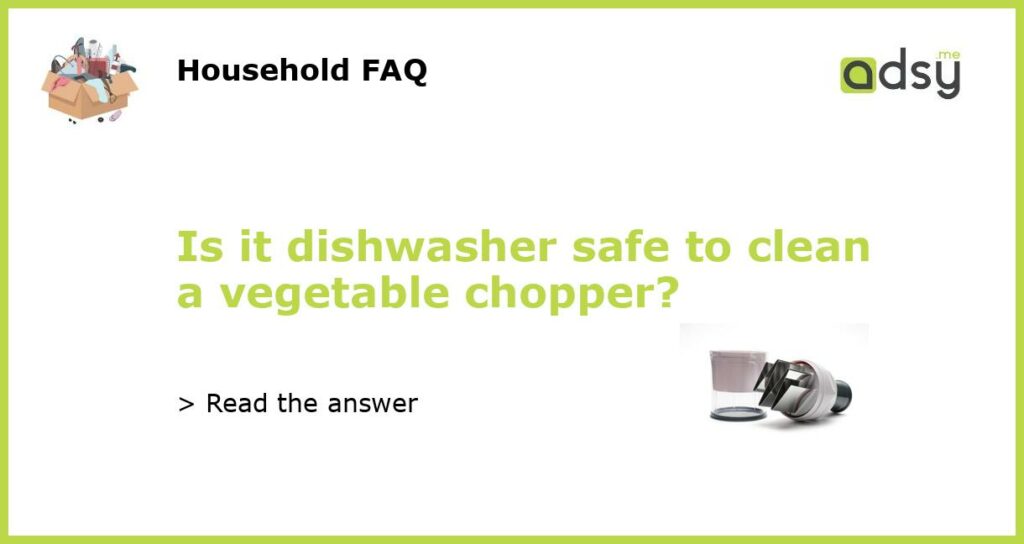Yes, it is dishwasher safe to clean a vegetable chopper
A vegetable chopper is a convenient kitchen tool that helps save time and effort when preparing meals. However, cleaning it can sometimes be a hassle. One common question that arises is whether a vegetable chopper is dishwasher safe. The answer to this question depends on the specific model of the vegetable chopper and its components. In general, most vegetable choppers are dishwasher safe, but it is important to check the manufacturer’s instructions for specific cleaning recommendations.
Checking the manufacturer’s instructions
Before placing your vegetable chopper in the dishwasher, it is important to read and follow the manufacturer’s instructions. These instructions will provide specific guidelines on how to clean and maintain your vegetable chopper. Some manufacturers may recommend hand washing the chopper’s blades or other components to prolong their lifespan. Others may specify that certain parts are dishwasher safe while others are not. It is crucial to adhere to these instructions to avoid damaging the vegetable chopper or reducing its efficiency.
Dishwasher safe components
In general, the main body of most vegetable choppers, as well as the containers or bowls, are typically dishwasher safe. These components are usually made of durable materials such as BPA-free plastic or stainless steel that can withstand the heat and agitation of a dishwasher cycle. It is advisable to place these parts on the top rack of the dishwasher to avoid direct exposure to the heating elements. This will help maintain the integrity of the plastic or stainless steel and prevent warping or melting.
However, it is important to note that certain parts of a vegetable chopper may not be dishwasher safe, especially the blades. Many vegetable choppers have sharp blades that can become dull or damaged when exposed to the high heat and powerful jets of a dishwasher. It is recommended to hand wash these blades using warm soapy water, ensuring that you use caution and follow proper safety measures to avoid injury. Scrub each blade carefully with a brush and rinse thoroughly before drying and storing.
Other cleaning methods
If your vegetable chopper is not dishwasher safe or if you prefer to hand wash it, there are alternative cleaning methods you can use. One method is to disassemble the chopper and soak the components in warm soapy water. This will help loosen food particles and make cleaning easier. Use a brush or sponge to scrub the parts, paying extra attention to the blades and any hard-to-reach areas. Rinse everything thoroughly and dry before reassembling the vegetable chopper.
Another cleaning method is to use a mixture of vinegar and baking soda. This natural cleaning solution can help remove stubborn stains and odors from the chopper. Simply sprinkle baking soda on the components, especially the blades, and then pour vinegar over them. Allow the mixture to sit for a few minutes to loosen any debris, then scrub and rinse as usual. This method can be effective for removing tough stains and odors without the need for harsh chemicals.
Maintaining the vegetable chopper
In addition to regular cleaning, it is important to properly maintain your vegetable chopper to ensure its longevity and performance. After each use, make sure to remove any food residue from the blades and other components. This will prevent bacteria growth and reduce the risk of cross-contamination. Drying the chopper thoroughly before storing it will also help prevent rust or corrosion. Store the chopper in a dry and clean area to avoid dust or dirt buildup.
In conclusion, most vegetable choppers are dishwasher safe, but it is essential to check the manufacturer’s instructions for specific cleaning recommendations. While the main body and containers of a vegetable chopper are usually dishwasher safe, the blades and other delicate components may require hand washing. If hand washing is necessary, soaking the chopper in warm soapy water or using a mixture of vinegar and baking soda can be effective cleaning methods. By following proper cleaning procedures and maintaining the vegetable chopper, you can ensure its cleanliness, efficiency, and longevity.





![Ninja Professional Chopper [NJ1002UKBK] Stackable, 200W, Black](https://m.media-amazon.com/images/I/41s9Vm+H4yL.jpg)
